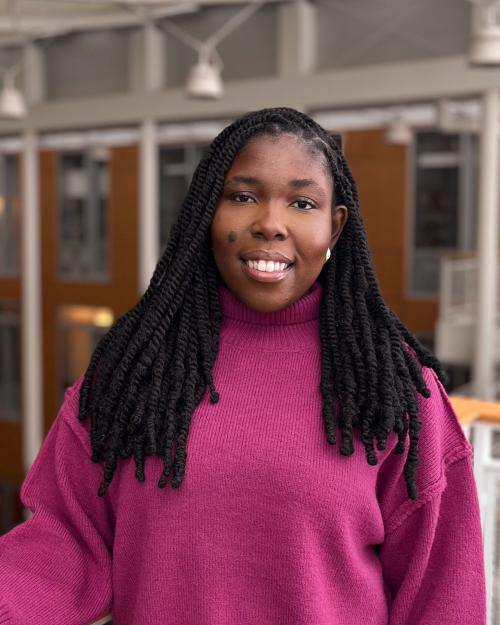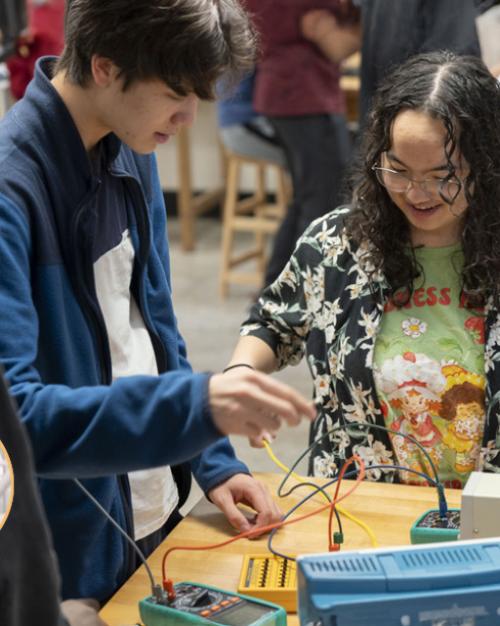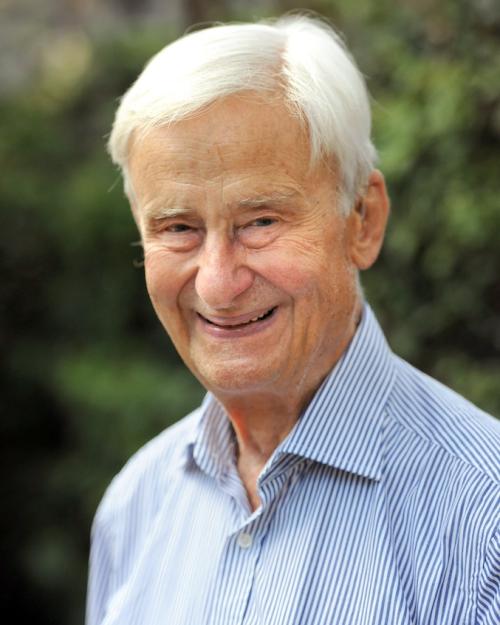Robert (Bobby) Pohl, the Goldwin Smith Professor of Physics Emeritus in the College of Arts and Sciences (A&S), died Aug. 30 in Göttingen, Germany. He was 94.
During more than 40 years at Cornell, Pohl was a central figure in foundational explorations of solid state physics, focusing on the properties of insulators through experiments at low temperatures. In particular, he shared in the 1971 discovery that glasses behave completely differently from crystals at low temperatures, but that all glasses – from window glass to hard candy (or glassy sucrose) – share remarkably similar thermal and transport properties.
His findings are still contributing to many areas of solid state physics.
Colleagues and former students remember Pohl for his brilliance, his diligence in pursuing experiments, and his kindness and compassion in working with others, especially when it came to guiding students.
“Pohl was a remarkable scientist with great impact on the field, and a wonderful colleague and friend,” said James Sethna, the James Gilbert White Professor of Physical Sciences (A&S).
Solid state physics was on the rise in the 1960s through the 1980s, Sethna said, with Cornell as a hub of discovery, along with the University of Illinois, Urbana-Champaign; and Bell Labs. Pohl was at the center of the work at Cornell, which focused on insulators. His sensitive experiments at low temperatures probed the transport of heat and sound through insulators.
His 1971 breakthrough, made with R.C. Zeller at Cornell, launched the next 50 years of the study of glasses, Sethna said.
“His discovery that the low-temperature properties of glasses are not only different from those of crystals but also universal – common to all disordered solids – posed a challenge to our understanding of glasses that persists to the present day,” said Andrea Liu, Ph.D. ’89, the Hepburn Professor of Physics at the University of Pennsylvania. “Bobby was not only a great scientist but also a great person. I will never forget his support for women. It was truly remarkable at the time and would be considered unusually strong even now.”
Pohl’s “amazing presence and work ethic” made an impression on Jeevak Parpia, M.S. ’77, Ph.D. ’79, professor of physics (A&S) from their first meeting, when Parpia was a prospective Cornell undergraduate in 1973.
“Later, when I was a Ph.D. student at Cornell, Bobby was always supportive. I think he appreciated seeing dedication and perseverance,” Parpia said. “When I joined the Department of Physics as a faculty member, Bobby and I were involved in teaching the graduate lab and delighted in each other’s company.”
Just after Pohl retired and became emeritus in 2000, the two worked together on several projects involving glasses at very low temperatures, accessible only in Parpia’s lab. They worked on this project for almost 10 years, publishing several papers in Physical Review Letters and other publications.
“Throughout, I was impressed by his physical intuition, enthusiasm and dedication,” Parpia said. “It was an intense and rewarding effort whose results are still bearing fruit in diverse areas. He will be missed by all of us who knew him in person, and we will likely never see another person wrought in the same mold.”
“Bobby Pohl was a truly good, generous, kind man,” said Susan Watson, Ph.D. ’92, the Benjamin F. Wissler Professor of Physics at Middlebury College. “Everyone recognized that he was a very special human being, someone who nurtured not only our intellects but also our souls.”
Robert Otto Pohl was born in Göttingen, Germany, on Dec. 17, 1929, into an extended family full of noted educators. His father, the physicist and professor Robert Wichard Pohl, was named the “father of solid state physics” by Nobel laureate Sir Nevill Mott.
He earned his B.A. in physics at the University of Freiburg in Germany in 1951, going on to graduate studies at the University of Erlangen in Germany, where he earned his Ph.D. in 1957.
In 1958, Pohl came to Cornell as a research associate and became a full professor in 1968. He retired as the Goldwin Smith Professor of Physics Emeritus in 2000.
Pohl was a member of the National Academy of Sciences and a fellow of the American Physical Society, among other honors. In 1985, he won the Oliver E. Buckley Condensed Matter Physics Prize, the field’s highest recognition, for his pioneering work on low-energy excitations in amorphous materials and important contributions to the understanding of thermal transport in solids. He received the Humboldt Senior Scientist Award in 1980, and a Guggenheim Fellowship for 1973-74.
He is survived by his wife, Karin Pohl; children Helene, Robert (known as Mecki) and Otto; and four grandchildren.
Read the story in the Cornell Chronicle.




